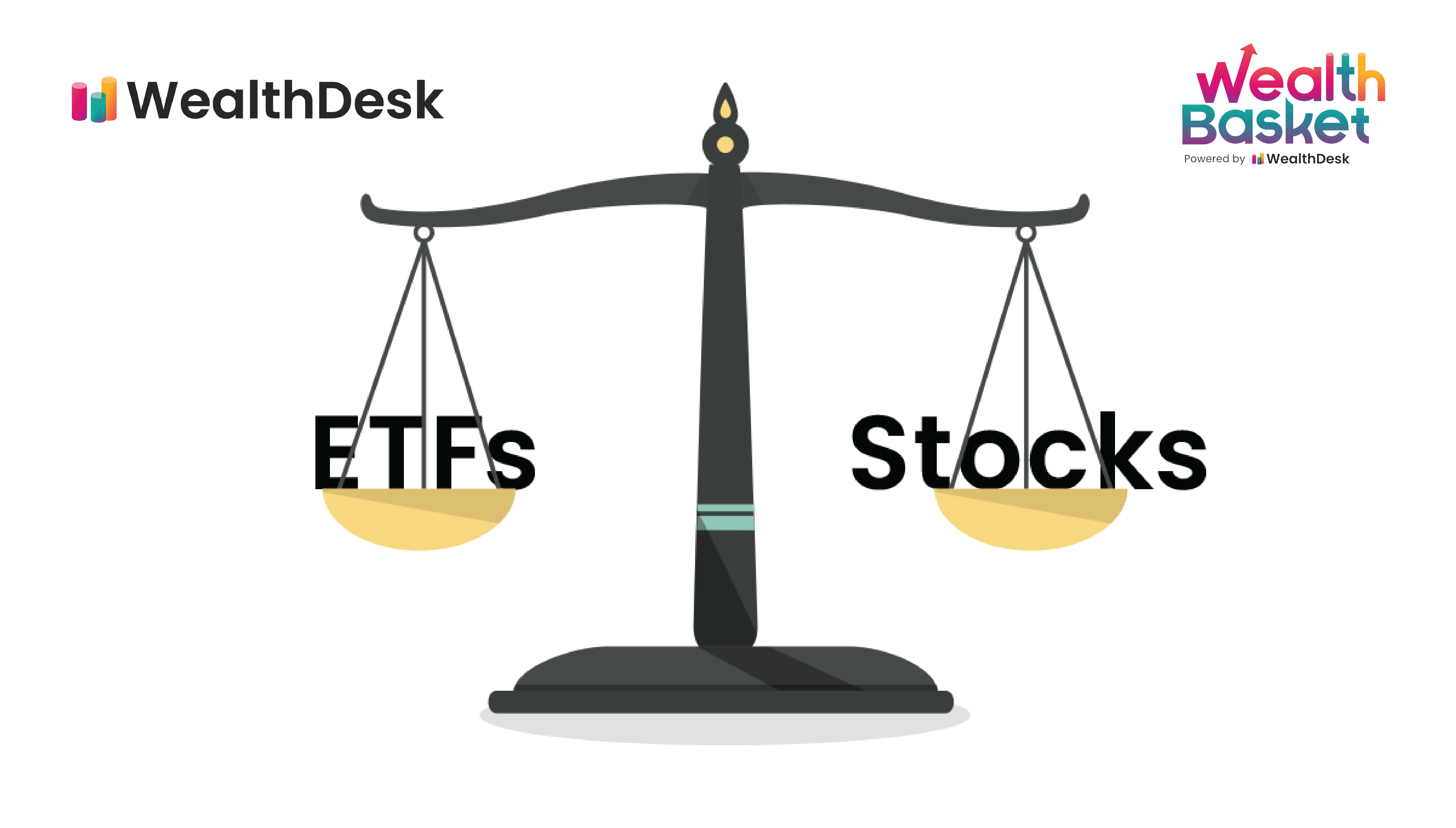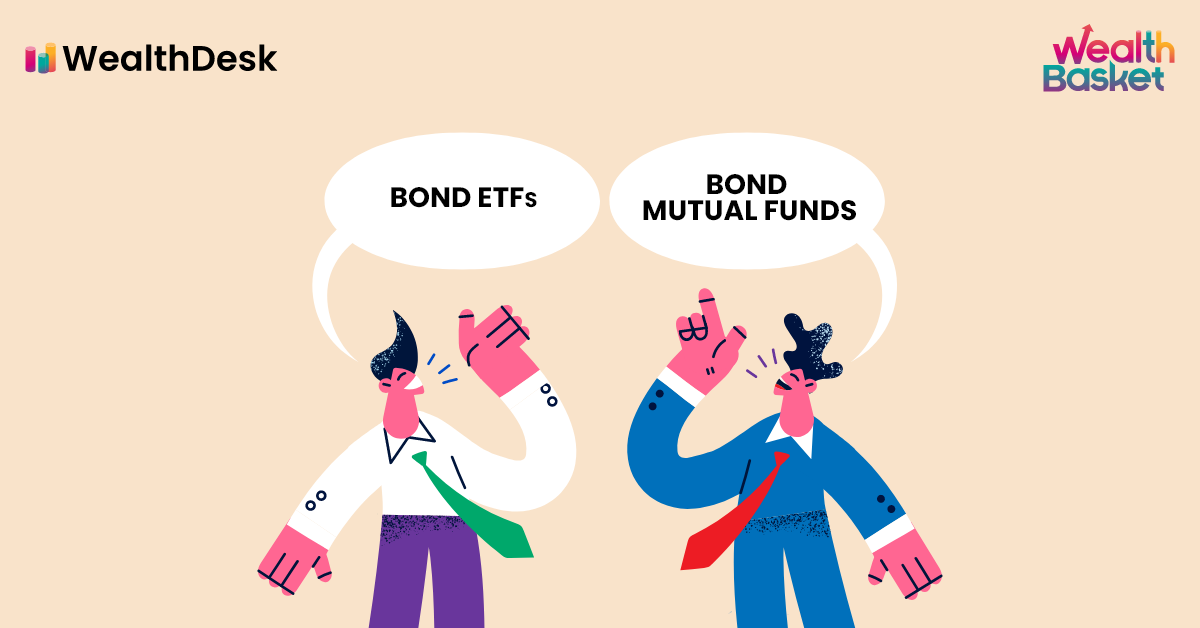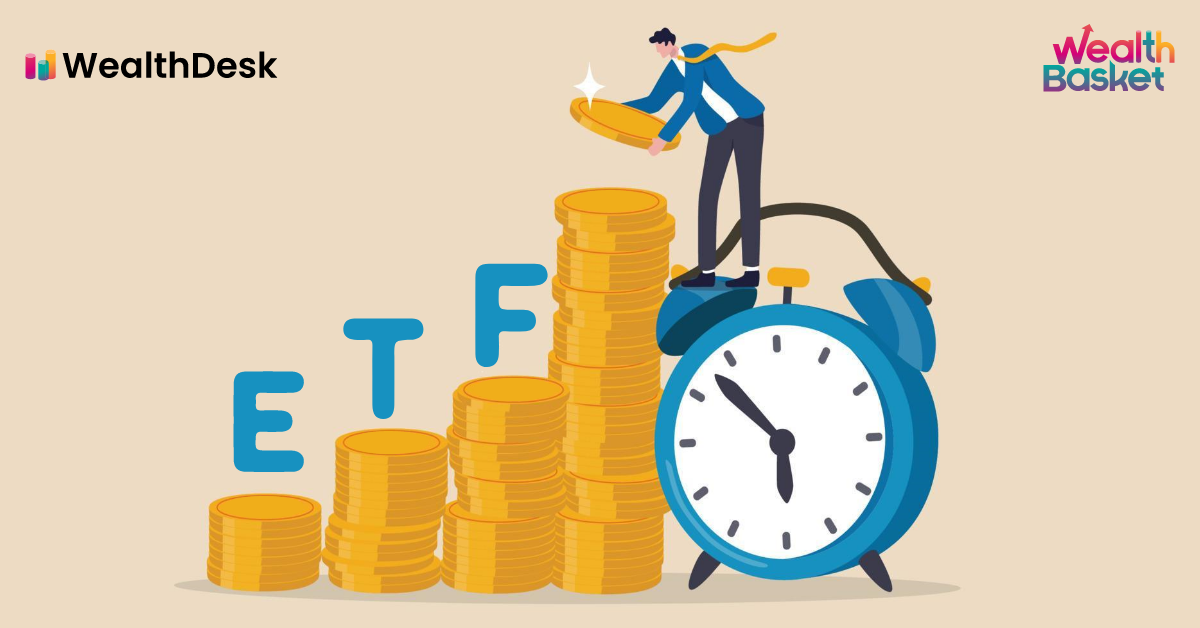ETFs vs stocks is unarguably one of the most discussed and debated topics in the world of investing. To choose between ETFs vs stocks, one should understand the features and characteristics of each of these instruments. Both ETFs and individual stocks are traded on the stock exchanges but have distinguishing features like risk factors, diversification, no. of securities, etc.
A deep-dive analysis enables investors to make informed decisions on stock market investments and ETF investments.
ETFs vs Stocks
Investing in individual stocks represents part ownership of the company. The extent of ownership depends upon the number of shares held to the total shares of the company. A company can raise money on stock exchanges by listing its shares. An investor can trade shares of a company through his Demat account.
Equity ETFs are exchange-traded funds that invest in stocks, fixed income securities, commodities, and other securities. The individual securities held by the fund are called the fund’s holdings. ETFs are traded just like ordinary shares/stocks through exchanges. An investor can purchase and sell ETFs just like stocks through its brokers.
Benefits of Stocks
Stock market investments provide numerous benefits to investors. Investing in stocks provides income to the investors in the form of dividends. Apart from dividends, companies also buy back their shares generally at a price higher than the prevailing market price. Generally, long-term investment in stocks provides capital appreciation to the investors leading to wealth creation.
Benefits of ETFs
Investing in ETFs vs individual stocks has its fair share of advantages. ETFs provide diversification to investors. ETFs reduce the overall risk through investment in a bucket of securities. Since the value of ETF is closer to the value of underlying securities in the bucket, there are fewer chances of large deviations in the price of ETFs compared to underlying assets. Just like stocks, ETFs also provide returns in the form of dividends and capital appreciation.
What is the difference between ETFs and Stocks?
Exchange-traded funds invest in multiple securities, whereas stock market investments are in individual shares of a company. Individual investors manage stock market investments. On the other hand, ETFs provide risk reduction through diversification. Professional money managers manage the ETF investments.
The broad differences between ETFs and stocks are as below:
-
Diversification
Multiple securities held by stock market ETFs provide diversification to the investors compared to stocks. An investor may invest in one stock of a sector. On the other hand, an ETF may invest in multiple securities, providing diversification to the investors.
-
Risk Reduction
Stock market ETFs are generally safer than individual stocks because ETF stocks reduce the risk for the investors through diversification. For example, profit in some securities compensates for the loss in other securities. On the contrary, substantial exposure in one stock increases the risk if the value of that particular stock falls significantly.
-
Professional Managers
Professional managers oversee ETF investments conversely to long-term investment stocks managed by individuals. The investor saves the trouble of deciding when to buy/sell securities and can rely on managers to make those decisions.
-
Cost Comparison
Since professional managers supervise ETF investments, there is a cost related to the managers’ fees. Investing in stocks does not entail this cost. However, an investor may save other costs like brokerage and other charges in case of ETF investments.
- Taxation
| ETFs | Stocks | |
| Short-term capital gains | Peak rate of tax for the investor | 15% |
| Long-term capital gains | 10% without indexation or 20% with indexation benefits | 10% (plus cess) if gains above ₹1 Lakh. No indexation |
| Dividends | 7.5% | Varying tax rates depending on multiple factors |
Are ETFs better than Stocks?
ETF investments make more sense for sectors with minor deviations from the average return because a stock investor may not generate substantial returns from any particular stock in that sector. ETFs can reasonably provide returns similar to any stock returns. Since there isn’t considerable upside for the stock investor, ETF investment becomes a preferred option.
Another scenario of investing in ETFs vs stocks is when the stock performance drivers are difficult to ascertain. The investor cannot select a stock that would outperform the sector consistently. ETF investments diversify this risk and provide better investment returns.
Stock market ETF is a better investment option for sectors where the volatility of individual stock returns is high. For such sectors, ETF reduces risk through diversification and provides stable returns. Some ETFs invest in companies of cyclical sectors, thereby giving investors investment opportunities during the industry’s up-cycle.
An investor may decide his investment preference based on the above factors. Few of the best ETFs in India for the last 05 years:
| Name of the Fund | 5 years Return (%) | Current AUM(In crores) |
| HDFC Index Fund | 15.94% | 2323.93 |
| Nippon India Index Fund | 15.92% | 166.48 |
| Tata Index Fund | 15.82% | 85.15 |
| LIC MF ETF-Sensex | 15.36% | 35.96 |
| IDFC Nifty Fund | 15.26% | 326.26 |
Are Stocks better than ETFs?
Long-term investments in stocks often provide better risk-adjusted returns and create wealth. Contrary to ETFs, a stock market investment may provide better returns when the deviation from the mean returns in a sector is very high. However, the critical point is that the investor invests in securities that outperform the ETF stocks.
A well-researched stock market investment professional may choose to invest in stocks based on his analysis of a particular company in a particular sector. The company may have a background of providing consistent returns to its investors and may outperform the sector in the coming years. Such investors may save investment managers-related costs.
Some of the long-term stocks in India have a history of providing excellent returns to investors. A few of the best long-term stocks in India (NSE 50) are as below:
| Name of the Company | 05 years Absolute Return (%) |
| Bajaj Finance | 573.7% |
| Tata Consumer | 507.5% |
| Bajaj Finserv | 493.7% |
| Titan | 359.5% |
| Reliance Industries | 344.7% |
Conclusion
To consider investing in ETFs or stocks, an investor may
weigh their preference based on the above factors.
WealthDesk, through portfolios built by the SEBI registered
professional advisers, allows investors to invest in
good long-term stocks and ETFs in India. Long-term
investment stocks and ETF investments have some upside
and some downside. The ultimate objective for the
investors should be to enhance the returns on their
stock market investments or ETF investments by
limiting/managing the associated risks.
FAQs
ETF investments are considered safer than stock investments due to certain advantages. ETFs are low-cost passive investment schemes managed by professionals. ETFs also provide diversification options to investors, thereby reducing risks.
ETF investments have certain downsides. ETFs may trade at a considerable premium or discount to the fair value of the stock market investments. Also, thematic ETFs which invest only in a specific sector (FMCG, Financials, etc.) may not provide the desired diversification to the investors.
ETFs charge fees
for managing the assets of the investors. Since ETFs
are passive funds, the fees are lower than the
actively managed funds. However, investing in stocks
does not entail any such fees to the investors.


















